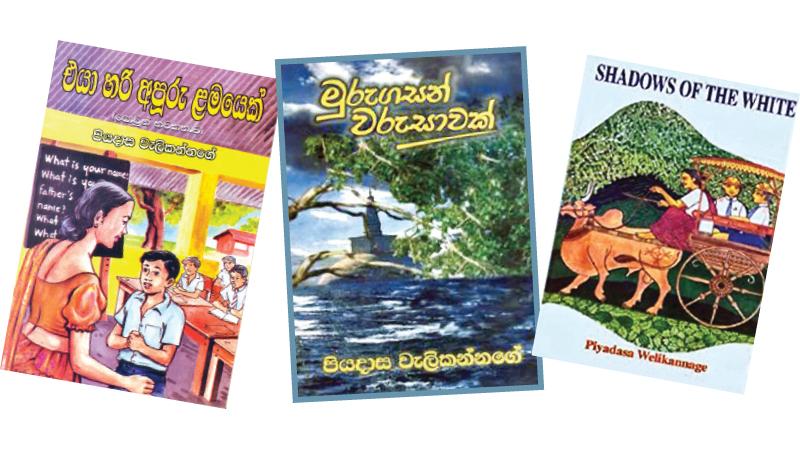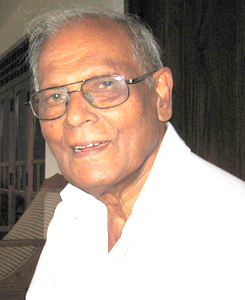
Piyadasa Welikannage is a veteran Sinhala novelist. His masterpiece, (Shadows of the White), published in 1987, won the state literary award for the best novel and still considers as one of the best Sinhala novels. His novels for adolescents, (Son, the adventurer) and (He is a funny boy) also won the state literary awards and other novels for the adolescents which include (Children taller than a mountain), (Smell of a flower reaches a long distance) are acclaimed books.
His other novels include (One moving story), (A torrential rain), (House near the Na tree) while his short story collections are (Life stopped) (A letter from Siva). Now, at the age of 86, he still writes and ready to publish his new novel, (This is not a mere imagination). The Sunday Observer met PiyadasaWelikannage to seek his views on his art of fiction.
Excerpts:
Q: How do you understand novel?
 A: I’ve understood novel by Jathaka Stories. Jathaka Stories, which consist of various stories on life, clarify complicated human experiences and make people understand what life is. Today, some people say that Jathaka Stories are no more value, but for me it is not just a Bana Katha or preaching text, it is a literary text or fiction that enlightens readers. There are so many good things that young novelists can learn from the Jathaka Stories.
A: I’ve understood novel by Jathaka Stories. Jathaka Stories, which consist of various stories on life, clarify complicated human experiences and make people understand what life is. Today, some people say that Jathaka Stories are no more value, but for me it is not just a Bana Katha or preaching text, it is a literary text or fiction that enlightens readers. There are so many good things that young novelists can learn from the Jathaka Stories.
Q: How does a story get written for you?
A: When a writer goes with life, he has to have many experiences and some of them enter into the inner self too. With time, these inner experiences, enlarged with some other experiences develop into a plot of a fiction. But for me, a story is not pre meditated. It is something developed when it is being written. However, the basic structure is formed before writing. And the story might be changed with the editing process.
Q: How do you identify a short story from a novel?
A: There is not a vast canvas and many characters in a short story like a novel and the characters are not roaming like a novel too. Nevertheless, short story is also a serious genre and a short story writer has to think about his media more seriously than a novelist.
Q: Could you elaborate your short story writing?
A: When I go to bed at night, a short story might come into my mind. At that time, I do not interfere with it, I let it develop in my mind and the story itself decides the time it comes out. In one night I write the whole story at once. But if a story is long, it might take a few days to finish.
Q: How long do you take to write a novel?
A: A few months. The story has to develop in my mind for more than a year during which I gather all the characters and atmosphere for the story. This developing process takes more time than writing it.
Q: Do you make sketches before writing?
A: No, I don’t have that kind of habit.
Q: Sudu Sewaneli (Shadows of the White) is your masterpiece. How was it written?
A: I worked as a Matale district’s Secretary of the Sri Lanka National Teachers’ Union. I had to go to various schools at that time and once went to a Kalundewa school on the Matale Dambulla main road. A dense forest was either side of the road and wild elephants were also there. I was taken there by the school principal who was one of my friends. However, when I went to the school, all the villagers came to see me. I talked to them closely. I felt that they had some peculiar accent which is so different from ours.
I asked a sheet of paper from my principal friend and wrote down all the peculiar words they talked without anyone’s knowledge. I had about 200 words. When I went home, I got an idea to write a story with these words. I started to write a story and invariably it was not a story in the contemporary period, but a historical novel. I went to the time of 1848 revolt by the up-country Sinhalese against the white rulers because the words I heard were more relevant to that time. That’s the way Sudu Sewaneli has been written. When I was writing it, I not only made use of those words, but took some of the historical events about the 1848 revolt and the stories with regard to the revolt.
Q: Did the characters come into the story easily?
A: I first establish the setting and characters come naturally. Characters, such as Puran Appu, Gongalegoda Banda I took from history and Sudu Banda, his brother and Podi Menike took from the society. At that time the only transport system we had was cart service. I also made use of it along with Ambalans or early resting places as the set. I took about four years to finish the novel.
Q: Is it difficult to write a historical novel?
A: Definitely, mainly because you have to research on the topic. You have to live in the story and the historical period every time you write it. You cannot go against the historical facts too.
Q: You consider yourself as an old pattern writer. Can you explain your art of writing?
A: I write by pen, not with a computer. Generally, I write four times a manuscript which means I take four versions of a manuscript. I start to write a story when it is digested by me. It is not a difficult task to write again and again, the only difficult task for me is to get ill.
Q: How do the day-today activities disturb your writing?
A: My wife died a few years ago. When she was alive, it was very easy to concentrate on writing. But now I have to focus on day-today work and my children’s affairs too. But I cannot break away from writing. Writing is a habit for me.
Q: Can you write a novel along with another project?
A: No. I enter into writing one by one.
Q: How do you think about your first novel, (One moving story) now?
A: It is funny to read it now, because there is a character going after a JP (Justice of the Peace) post. He is following politicians too to get that post.
Q: Do you edit your manuscript before handing it over to the publisher?
A: Yes. But that editing work is done only by me. I know it is not much a successful process, but I don’t have any other option. There are no professional editors here. I felt it more intensely when I went to Russia.
“I went to the writers’ club in Moscow where writers gathered and discussed the manuscripts. I could see tables, chairs and other things used by writers, such as Tolstoy, Dostoyevsky and Maxim Gorky. Those places are protected by the Russian Government. I realised how much they discussed about a manuscript before it was published. Maybe it might have helped the Russian literature to become prominent in theworld. We should discuss and edit a manuscript many times before it is sent to the publisher.
